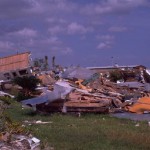
We’ve all seen the devastating television footage of Mother Nature’s fury. From out of control wildfires in the Southwest to historic flooding and the ravages of hurricanes in the Northeast, it seems that no one is immune to the destruction brought on by weather-related storms. Knowing how to survive financially before a storm strikes is so important to how you will recover, yet it is rarely covered in news stories or FEMA training videos.
Let’s take a look at some of the simple steps you can take to protect your most valuable assets before a natural disaster.
Step One – Take video of every room of your home including any valuable items such as big screen televisions, musical instruments, workshop power tools or family heirlooms. Keep a separate written list of these items and their associated values or paper receipts in a water-tight safe deposit box.
Step Two – Know your insurance coverage options and what you have for specific coverage. When was the last time you reviewed your homeowner’s or renter’s policy? Call your insurance agent and request a formal review of your coverage and make sure to include anything that has changed or been added to your home or property since the last review.
- Do you know what your out-of-pocket deductible is?
- Do you have replacement cost insurance on all of the items in your dwelling?
- Does your insurance provide alternative housing payments in the event that your home becomes unlivable?
Know your specific insurance agency contact once a natural disaster occurs and again, take video and photos of everything before you touch one missing shingle or broken window. Once you have documented the loss on video or digital photography, do the minimum repair work necessary to secure the property until you can arrange for a damage assessment from your insurance company.
If your area was declared a Federal Emergency Area, you can contact your local FEMA agency regarding possible Federal assistance.
What happens to your mortgage and other bills during the post-event recovery period?
Many creditors have a process for working with customers affected by a national disaster. You are still responsible for any debts you’ve incurred and their timely payments, so plan accordingly and be sure your emergency kit has list of current monthly debts, contact information, and the amounts you owe. If paying all your monthly obligations isn’t immediately feasible, talk with each creditor about your situation. In the interim, you can start by paying the debts with the highest interest rate first and work your way through the list.
Contact your mortgage holder immediately to notify them of the event and your current situation with the property. Many mortgage holders have assistance programs for homeowners during the immediate and extended rebuilding period. Often these programs cannot provide much in the way of financial assistance if your family is living off site ad your place of employment has also been destroyed. This is where it is critical to speak with a certified bankruptcy attorney before time drains away what is left of your savings and your creditors are lining up demanding payments. A bankruptcy attorney can guide you through the decision making process and help you map a pathway back to financial solvency once more.
To learn more about recovery after a natural disaster and how you can work with your creditors to restore your financial life, talk with Attorney Richard Gaudreau by calling (603) 893-4300.
